Synopsis: Oil and Gas Industry Curse in Developing Nations
VerifiedAdded on 2022/10/16
|6
|862
|102
Project
AI Summary
This synopsis explores the complex relationship between the oil and gas industry and the economic development of developing countries. It begins with an introduction outlining the concept of the 'oil curse,' where abundant natural resources paradoxically hinder economic growth due to poor management and investment. The synopsis includes a review of relevant literature, problem statement, and the need for the research, highlighting the adverse consequences of resource abundance on industrialization and growth. The objectives are clearly defined, aiming to understand the operations of the oil and gas industry, identify the reasons behind its perceived negative impact, and recommend strategies for improvement. The research methodology will employ a primary research approach, utilizing surveys to gather data, along with a review of secondary sources. A sample size of 50 is chosen for the survey, and the expected outcome is to identify the underlying causes of the oil and gas industry's negative impact. The synopsis concludes with a bibliography of cited sources.
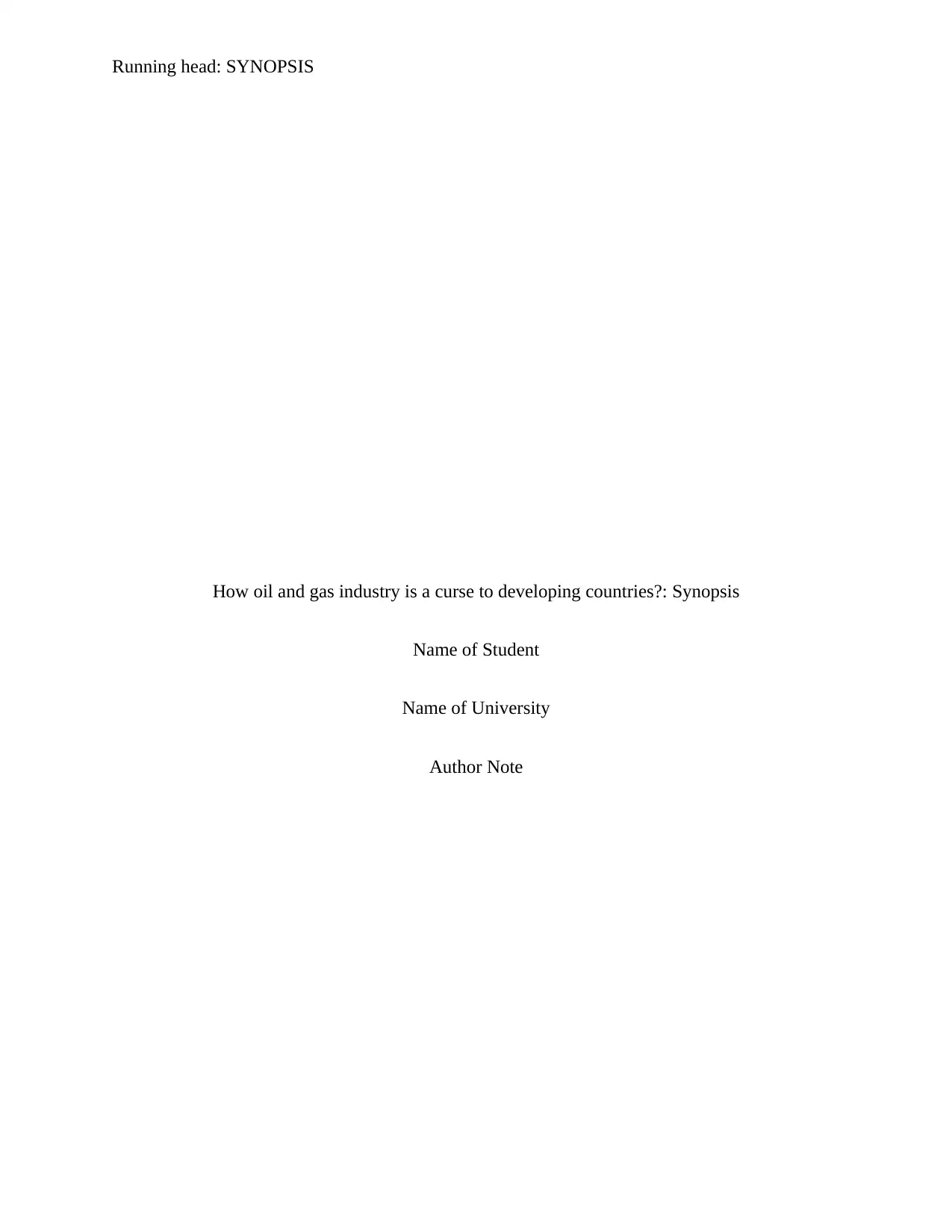
Running head: SYNOPSIS
How oil and gas industry is a curse to developing countries?: Synopsis
Name of Student
Name of University
Author Note
How oil and gas industry is a curse to developing countries?: Synopsis
Name of Student
Name of University
Author Note
Paraphrase This Document
Need a fresh take? Get an instant paraphrase of this document with our AI Paraphraser
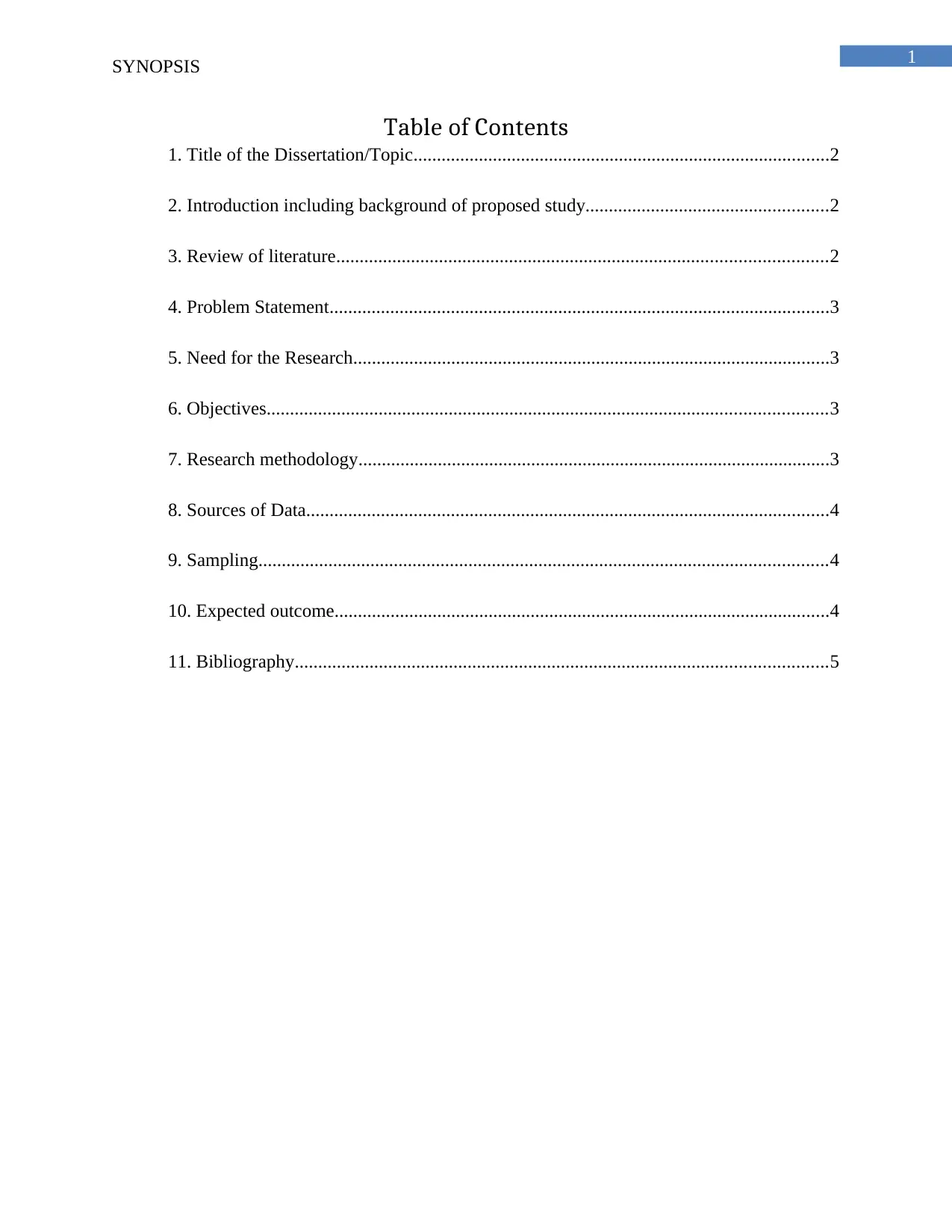
1
SYNOPSIS
Table of Contents
1. Title of the Dissertation/Topic.........................................................................................2
2. Introduction including background of proposed study....................................................2
3. Review of literature.........................................................................................................2
4. Problem Statement...........................................................................................................3
5. Need for the Research......................................................................................................3
6. Objectives........................................................................................................................3
7. Research methodology.....................................................................................................3
8. Sources of Data................................................................................................................4
9. Sampling..........................................................................................................................4
10. Expected outcome..........................................................................................................4
11. Bibliography..................................................................................................................5
SYNOPSIS
Table of Contents
1. Title of the Dissertation/Topic.........................................................................................2
2. Introduction including background of proposed study....................................................2
3. Review of literature.........................................................................................................2
4. Problem Statement...........................................................................................................3
5. Need for the Research......................................................................................................3
6. Objectives........................................................................................................................3
7. Research methodology.....................................................................................................3
8. Sources of Data................................................................................................................4
9. Sampling..........................................................................................................................4
10. Expected outcome..........................................................................................................4
11. Bibliography..................................................................................................................5
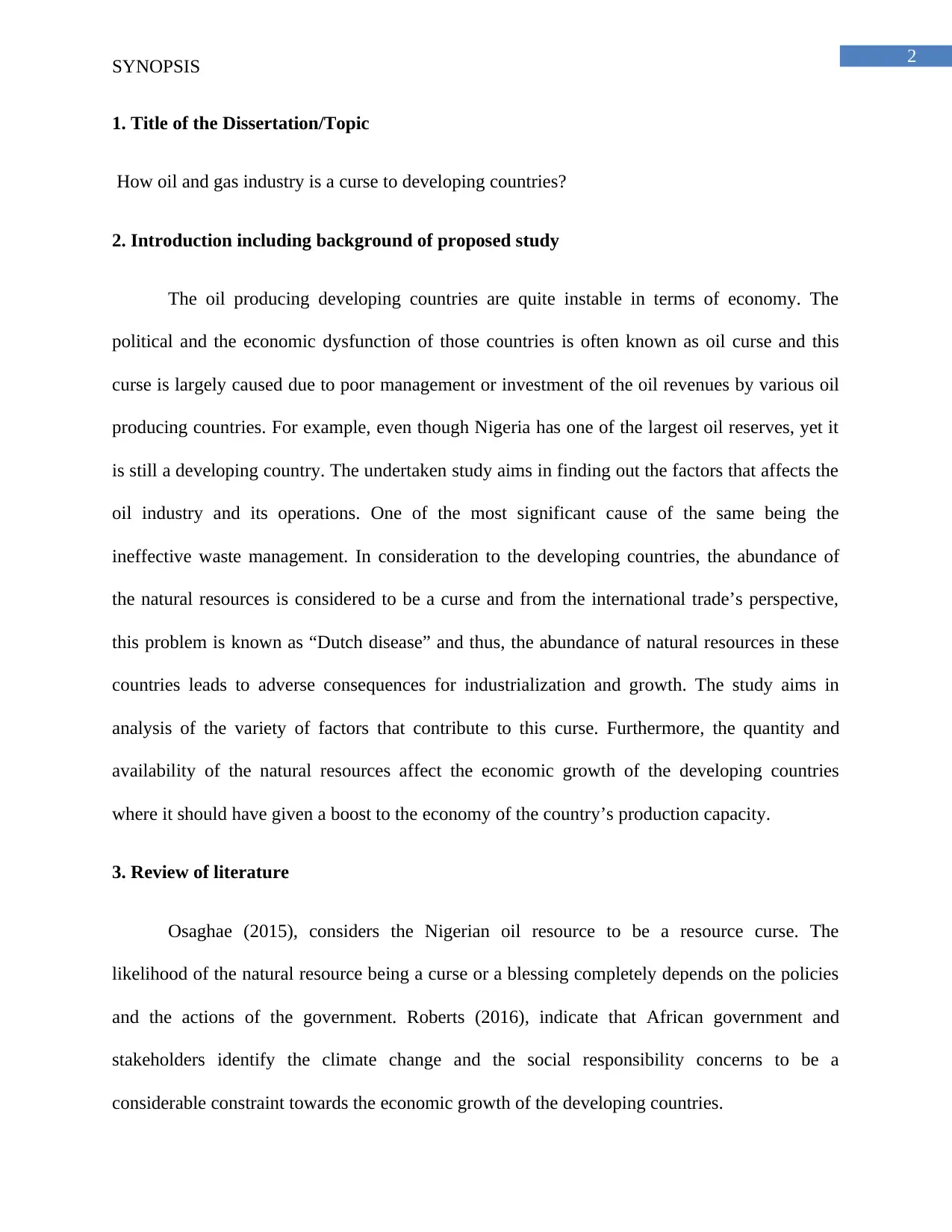
2
SYNOPSIS
1. Title of the Dissertation/Topic
How oil and gas industry is a curse to developing countries?
2. Introduction including background of proposed study
The oil producing developing countries are quite instable in terms of economy. The
political and the economic dysfunction of those countries is often known as oil curse and this
curse is largely caused due to poor management or investment of the oil revenues by various oil
producing countries. For example, even though Nigeria has one of the largest oil reserves, yet it
is still a developing country. The undertaken study aims in finding out the factors that affects the
oil industry and its operations. One of the most significant cause of the same being the
ineffective waste management. In consideration to the developing countries, the abundance of
the natural resources is considered to be a curse and from the international trade’s perspective,
this problem is known as “Dutch disease” and thus, the abundance of natural resources in these
countries leads to adverse consequences for industrialization and growth. The study aims in
analysis of the variety of factors that contribute to this curse. Furthermore, the quantity and
availability of the natural resources affect the economic growth of the developing countries
where it should have given a boost to the economy of the country’s production capacity.
3. Review of literature
Osaghae (2015), considers the Nigerian oil resource to be a resource curse. The
likelihood of the natural resource being a curse or a blessing completely depends on the policies
and the actions of the government. Roberts (2016), indicate that African government and
stakeholders identify the climate change and the social responsibility concerns to be a
considerable constraint towards the economic growth of the developing countries.
SYNOPSIS
1. Title of the Dissertation/Topic
How oil and gas industry is a curse to developing countries?
2. Introduction including background of proposed study
The oil producing developing countries are quite instable in terms of economy. The
political and the economic dysfunction of those countries is often known as oil curse and this
curse is largely caused due to poor management or investment of the oil revenues by various oil
producing countries. For example, even though Nigeria has one of the largest oil reserves, yet it
is still a developing country. The undertaken study aims in finding out the factors that affects the
oil industry and its operations. One of the most significant cause of the same being the
ineffective waste management. In consideration to the developing countries, the abundance of
the natural resources is considered to be a curse and from the international trade’s perspective,
this problem is known as “Dutch disease” and thus, the abundance of natural resources in these
countries leads to adverse consequences for industrialization and growth. The study aims in
analysis of the variety of factors that contribute to this curse. Furthermore, the quantity and
availability of the natural resources affect the economic growth of the developing countries
where it should have given a boost to the economy of the country’s production capacity.
3. Review of literature
Osaghae (2015), considers the Nigerian oil resource to be a resource curse. The
likelihood of the natural resource being a curse or a blessing completely depends on the policies
and the actions of the government. Roberts (2016), indicate that African government and
stakeholders identify the climate change and the social responsibility concerns to be a
considerable constraint towards the economic growth of the developing countries.
⊘ This is a preview!⊘
Do you want full access?
Subscribe today to unlock all pages.

Trusted by 1+ million students worldwide
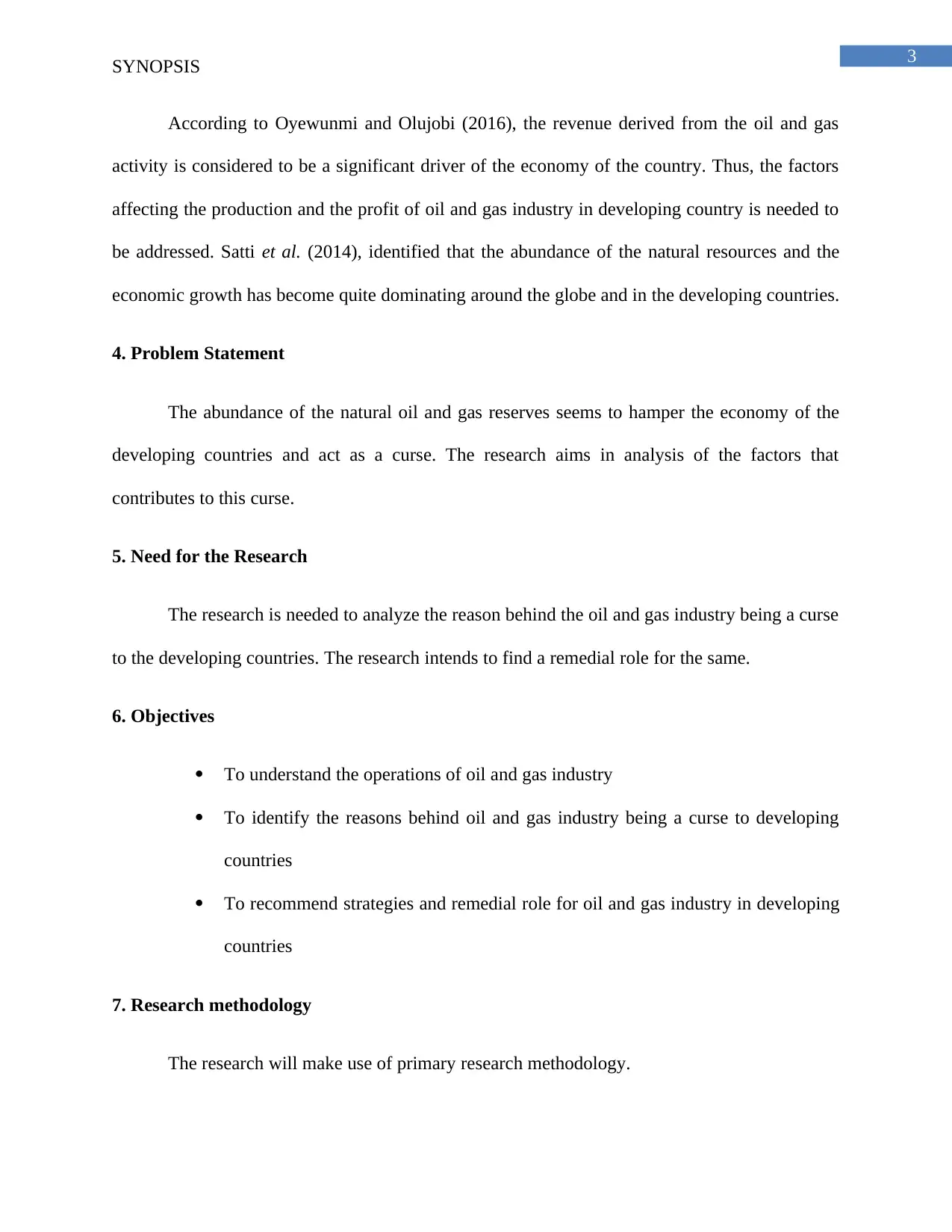
3
SYNOPSIS
According to Oyewunmi and Olujobi (2016), the revenue derived from the oil and gas
activity is considered to be a significant driver of the economy of the country. Thus, the factors
affecting the production and the profit of oil and gas industry in developing country is needed to
be addressed. Satti et al. (2014), identified that the abundance of the natural resources and the
economic growth has become quite dominating around the globe and in the developing countries.
4. Problem Statement
The abundance of the natural oil and gas reserves seems to hamper the economy of the
developing countries and act as a curse. The research aims in analysis of the factors that
contributes to this curse.
5. Need for the Research
The research is needed to analyze the reason behind the oil and gas industry being a curse
to the developing countries. The research intends to find a remedial role for the same.
6. Objectives
To understand the operations of oil and gas industry
To identify the reasons behind oil and gas industry being a curse to developing
countries
To recommend strategies and remedial role for oil and gas industry in developing
countries
7. Research methodology
The research will make use of primary research methodology.
SYNOPSIS
According to Oyewunmi and Olujobi (2016), the revenue derived from the oil and gas
activity is considered to be a significant driver of the economy of the country. Thus, the factors
affecting the production and the profit of oil and gas industry in developing country is needed to
be addressed. Satti et al. (2014), identified that the abundance of the natural resources and the
economic growth has become quite dominating around the globe and in the developing countries.
4. Problem Statement
The abundance of the natural oil and gas reserves seems to hamper the economy of the
developing countries and act as a curse. The research aims in analysis of the factors that
contributes to this curse.
5. Need for the Research
The research is needed to analyze the reason behind the oil and gas industry being a curse
to the developing countries. The research intends to find a remedial role for the same.
6. Objectives
To understand the operations of oil and gas industry
To identify the reasons behind oil and gas industry being a curse to developing
countries
To recommend strategies and remedial role for oil and gas industry in developing
countries
7. Research methodology
The research will make use of primary research methodology.
Paraphrase This Document
Need a fresh take? Get an instant paraphrase of this document with our AI Paraphraser
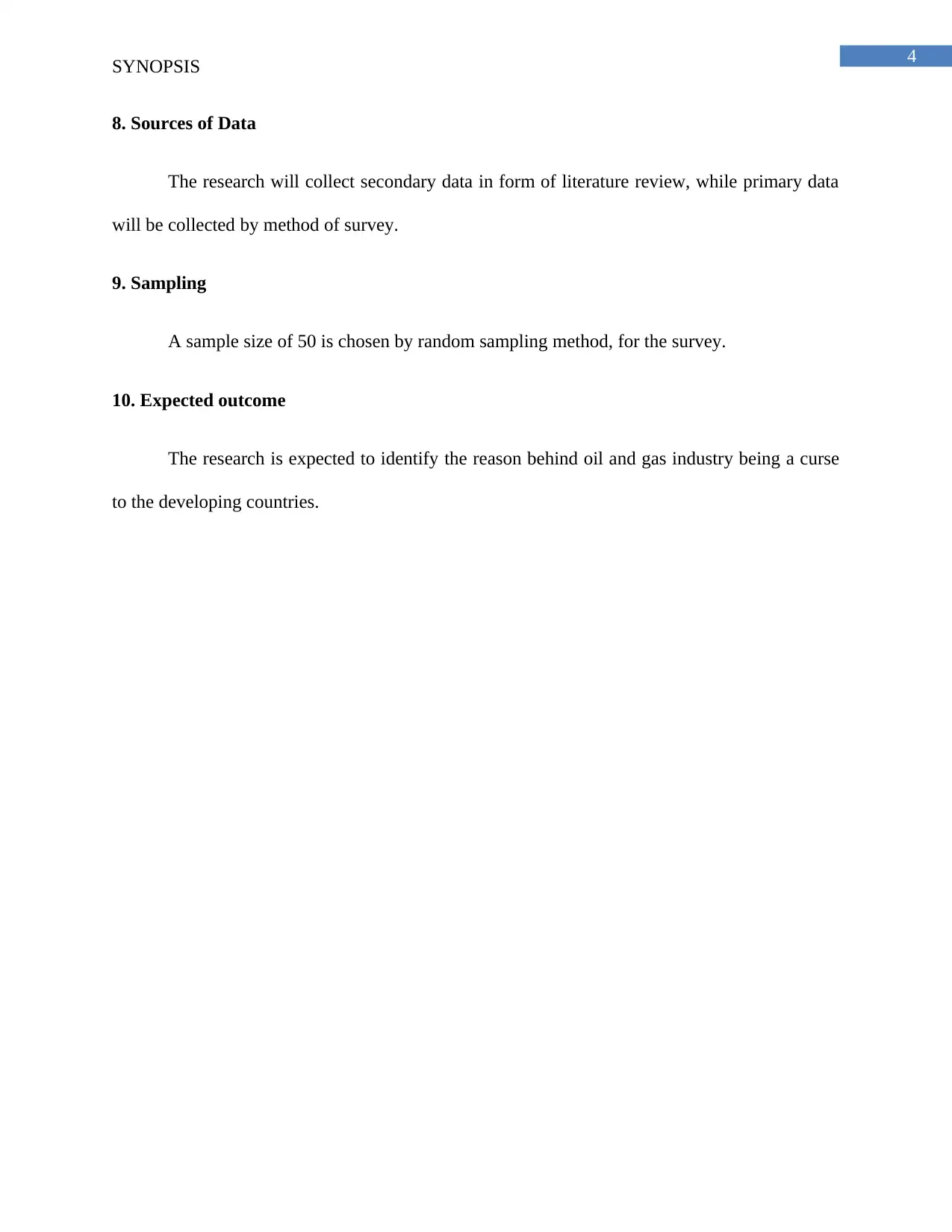
4
SYNOPSIS
8. Sources of Data
The research will collect secondary data in form of literature review, while primary data
will be collected by method of survey.
9. Sampling
A sample size of 50 is chosen by random sampling method, for the survey.
10. Expected outcome
The research is expected to identify the reason behind oil and gas industry being a curse
to the developing countries.
SYNOPSIS
8. Sources of Data
The research will collect secondary data in form of literature review, while primary data
will be collected by method of survey.
9. Sampling
A sample size of 50 is chosen by random sampling method, for the survey.
10. Expected outcome
The research is expected to identify the reason behind oil and gas industry being a curse
to the developing countries.
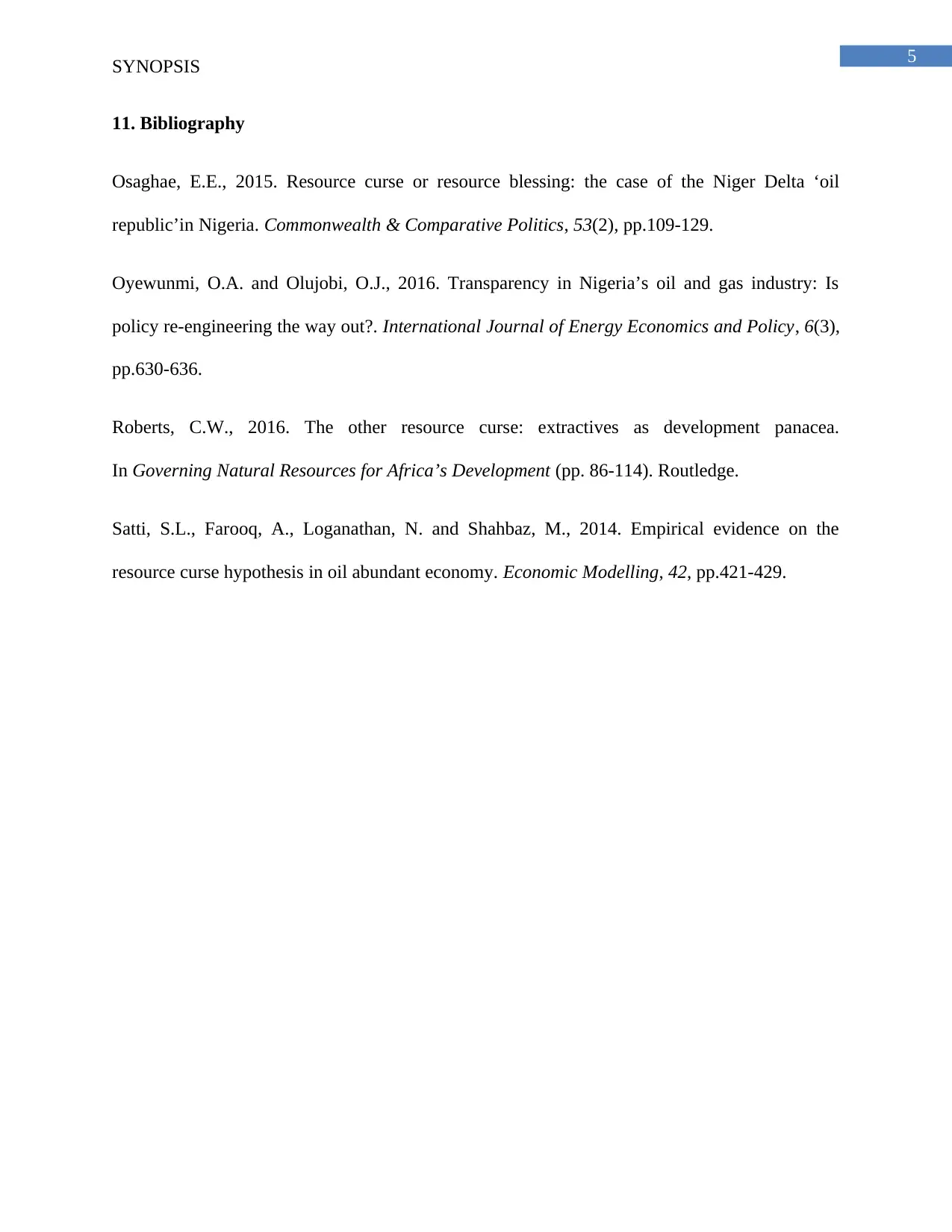
5
SYNOPSIS
11. Bibliography
Osaghae, E.E., 2015. Resource curse or resource blessing: the case of the Niger Delta ‘oil
republic’in Nigeria. Commonwealth & Comparative Politics, 53(2), pp.109-129.
Oyewunmi, O.A. and Olujobi, O.J., 2016. Transparency in Nigeria’s oil and gas industry: Is
policy re-engineering the way out?. International Journal of Energy Economics and Policy, 6(3),
pp.630-636.
Roberts, C.W., 2016. The other resource curse: extractives as development panacea.
In Governing Natural Resources for Africa’s Development (pp. 86-114). Routledge.
Satti, S.L., Farooq, A., Loganathan, N. and Shahbaz, M., 2014. Empirical evidence on the
resource curse hypothesis in oil abundant economy. Economic Modelling, 42, pp.421-429.
SYNOPSIS
11. Bibliography
Osaghae, E.E., 2015. Resource curse or resource blessing: the case of the Niger Delta ‘oil
republic’in Nigeria. Commonwealth & Comparative Politics, 53(2), pp.109-129.
Oyewunmi, O.A. and Olujobi, O.J., 2016. Transparency in Nigeria’s oil and gas industry: Is
policy re-engineering the way out?. International Journal of Energy Economics and Policy, 6(3),
pp.630-636.
Roberts, C.W., 2016. The other resource curse: extractives as development panacea.
In Governing Natural Resources for Africa’s Development (pp. 86-114). Routledge.
Satti, S.L., Farooq, A., Loganathan, N. and Shahbaz, M., 2014. Empirical evidence on the
resource curse hypothesis in oil abundant economy. Economic Modelling, 42, pp.421-429.
⊘ This is a preview!⊘
Do you want full access?
Subscribe today to unlock all pages.

Trusted by 1+ million students worldwide
1 out of 6
Related Documents
Your All-in-One AI-Powered Toolkit for Academic Success.
+13062052269
info@desklib.com
Available 24*7 on WhatsApp / Email
![[object Object]](/_next/static/media/star-bottom.7253800d.svg)
Unlock your academic potential
Copyright © 2020–2026 A2Z Services. All Rights Reserved. Developed and managed by ZUCOL.





